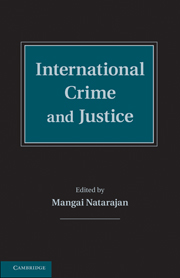Book contents
- Frontmatter
- Contents
- List of Figures
- List of Tables
- List of Contributors
- Foreword
- Preface
- Introduction
- Part I International Criminology
- Part II Law, Punishment, and Crime Control Philosophies of the World
- Part III Transnational Crime
- Part IV Organized Crime and Terrorism
- Part V International crime
- Part VI Delivering International Justice
- Part VII International Cooperation and Criminal Justice
- Part VIII International Research and Crime Statistics
- Part IX International research resources
- World Map
- Index
Part VI - Delivering International Justice
Published online by Cambridge University Press: 05 October 2014
- Frontmatter
- Contents
- List of Figures
- List of Tables
- List of Contributors
- Foreword
- Preface
- Introduction
- Part I International Criminology
- Part II Law, Punishment, and Crime Control Philosophies of the World
- Part III Transnational Crime
- Part IV Organized Crime and Terrorism
- Part V International crime
- Part VI Delivering International Justice
- Part VII International Cooperation and Criminal Justice
- Part VIII International Research and Crime Statistics
- Part IX International research resources
- World Map
- Index
Summary
As explained in the introductory chapter, the Rome Statute defines international crimes as the gravest crimes that threaten the peace, security, and well-being of the world. Because these crimes are of such gravity, the Statute declares “it is the duty of every State to exercise its criminal jurisdiction over those responsible for international crimes.” This provides the foundation for international criminal law and for the institutions required to uphold and deliver that law. This section of the book is concerned with the various legal instruments, international treaties (see Chapter 45 by Gloria Brown Marshall), charters, protocols, and understandings that have contributed to the development of international criminal law and it deals with the criminal tribunals, commissions, and courts that are playing a part in administering the law. It describes the important role of the United Nations in these developments and it provides several chapters describing the International Criminal Court (ICC), the court’s short history, and key aspects of the court’s work.
The United Nations has long been concerned with the development of international laws and standards. This work falls into two basic categories: (1) the formation of international obligations by treaty to criminalize, at the national and international level, activities of fundamental concern to the international community; and (2) the development of norms and standards in criminal justice, which are desirable or even obligatory practices (see Chapter 44 by Roger Clark).
- Type
- Chapter
- Information
- International Crime and Justice , pp. 335 - 336Publisher: Cambridge University PressPrint publication year: 2010

